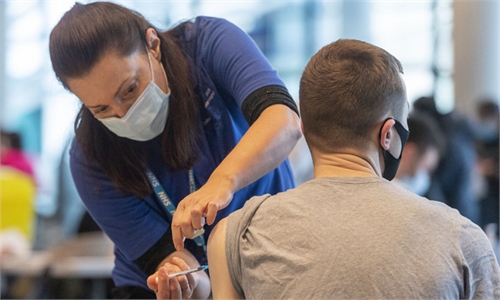Nothing short of remarkable what China has accomplished in the healthcare sector: Canadian cardiac surgeon

Workers unload Chinese COVID-19 vaccines at an airport in Managua, Nicaragua, on December 24, 2021. Photo: Xinhua
Editor's Note:
For Chinese people, the past decade has been epic and inspirational. The country, under the leadership of the Communist Party of China (CPC) Central Committee with Comrade Xi Jinping at the core, has made great endeavors in boosting its economy, deepening reforms, improving the rights of its people and acting as a responsible global power.
Over the last 10 years, "it is nothing short of remarkable what China has accomplished in the healthcare sector," said Lee Errett (Errett), a renowned cardiac surgeon in Canada and president of Bethune Medical Development Association of Canada. In an interview with Global Times (GT) reporters Yu Jincui and Liu Zixuan, he said China is successful in dealing with the COVID-19 epidemic and countries should have more and more cooperation instead of making anti-pandemic policy a political issue.
This is the 26th article of the Global Times series about this special decade.
GT: Some Chinese media called you new-age Bethune, can you talk about your feelings about this title? Why should China-Canada relations still commemorate and emphasize the spirit of Bethune?
Errett: My personal feeling is that I should not be called the "new-age Bethune," but our organization should be called the "new-age Bethune." I represent our organization as the president, but it's not just one individual, it's a whole group. Bethune was very good at assembling people to work together. He taught students and doctors and created a team. So, we still have a team now to represent the Bethune Spirit in China and in Canada in that manner.
GT: For many Chinese people, Bethune represents the goodwill and selfless help of the Canadian people to China. How many people in Canada are still commemorating Bethune now? Is he being gradually forgotten and why?
Errett: I think in China, not all young people still remember Bethune, while the older ones certainly do. But he wasn't as big a personality in Canada as he was in China. In fact, he was considered to be a maverick, a renegade. But when we look back in history, he was responsible for having socialized medicine in Canada, which is one of the best contributions to a nation where nobody goes untreated. Then, his ideas went to China.
We have his statues in Montreal and Toronto. We also have his birthplace. But I've asked a large number of students, and they're not quite aware of the magnitude of what Bethune did. When you think back in 1939, there was no TV, no internet, a little bit of radio, and just newspapers. So the communication wasn't like today. Now we have set up a Bethune Roundtable for global surgery, so that all universities in Canada can contribute to that. We also have an annual event where Bethune is discussed. So he is not forgotten in some circles, but to everybody on the street, he might not be a household name.
GT: You visited China more than 20 times. Based on your contacts and cooperation with China, how do you evaluate China's development and progress over the past decades, what impressed you the most and why?
Errett: I don't know about all around the world, but I can imagine that the development in the last 20 years in China ranks up there at almost any time in the history of the world. It is nothing short of remarkable what China has accomplished in the healthcare sector. It's amazing how quickly new hospitals, systems, and networks are constructed. When people here talk about the changes in China, that's one thing I tell them: The changes in China have been spectacular.
GT: The Bethune Medical Development Association of Canada has played an important role in promoting China-Canada anti-epidemic cooperation. As a doctor, how do you evaluate China's achievements in fighting the COVID-19 epidemic?
Errett: Countries around the world have tremendously different ways of combating the virus. Even Canada and the US have employed different methods. China takes lockdowns very seriously, because we have tried to go to China but have to face 14 days in quarantine. I don't know how it is now, as things are changing rapidly. It was successful for China. It turns out that the method of lockdown is important.
I don't know if I can evaluate or even be in a position to criticize other countries for how they do things. Because the fact of the matter is that nobody really knew how to do it. We all make mistakes. But I think in the future, ideally, countries should have more and more cooperation instead of making it a political issue. It's not a political virus. We should team up, get the best resources, and find the best ways to fight it with evidence-based medicine. Cooperation would be better for all the people.
GT: Since the outbreak of the epidemic, China has prioritized the protection of people's lives. The COVID-19 has caused the average life expectancy in the US to decline for two consecutive years while due to successful prevention and control of the epidemic, the average life expectancy in China has surpassed that of the US. What differences do you think has this reflected in protecting people's human rights in China and in the US?
Errett: In the US, there was a lot of disparity between different regions in terms of whether people wore masks or not. I don't look upon it as a human right to not wear a mask. Wearing masks not only protects you, but also protects other people. It should be your moral obligation to do that. You should not say that it's my right not to wear a mask on a plane. I think that's silly, as people have to abide by the rules that have been proven. We initially thought the virus would be over in three months or a couple of months. But now we know that COVID-19 is different from other viruses. It is a very painful experience for the whole world. So I think we must prepare for it, as it is different than anything we've ever experienced before. As I said above, it should be a cooperative thing to find the best ways. We should learn from you, and you should learn from us.
GT: You called for an international anti-pandemic cooperation. In your opinion, what is the biggest obstacle to international anti-pandemic cooperation now? What efforts should be made to advance the cooperation?
Errett: Because the world's population is growing so quickly, we should treat it as a global issue and not ignore poor countries and regions. For example, we have gone to Africa a lot, and they are at a distinct disadvantage in health care. I commend Chinese people who have sent equipment and other things to Africa and other needy countries. Now, we have done that too. But I know China was at the forefront of that.
Then after that, we may face long-term challenges. We are all learning along the way. We should also concentrate on both identifying the risks and the vulnerable people and putting resources there. Also, we should focus on the side effects of COVID-19, like the influence of closing schools and limiting education and social interaction for young people. If there is no cooperation, there's going to be an imbalance. We need to recognize that you've got to be honest and tell the truth, and then go with the best evidence that you can find. Different countries and regions have different situations. We should share the truth and what we have learned, such as which vaccine is the best and which masks are the best. We should know what the best treatments are for a particular situation.
I think, over time, we'll get better. The most important thing we ought to do is look at what other countries have done and listen to people who are the experts on it. Science is science and it does not have a political side. This is what works the best.


